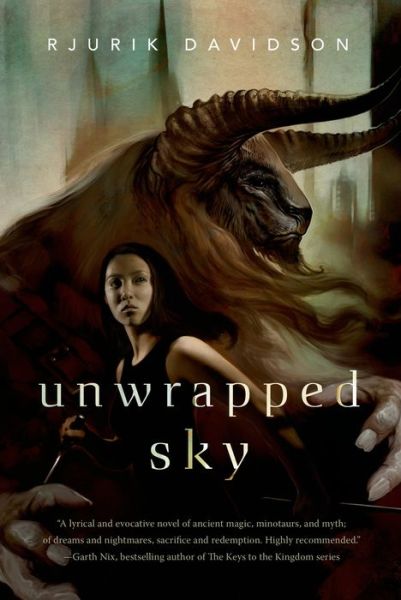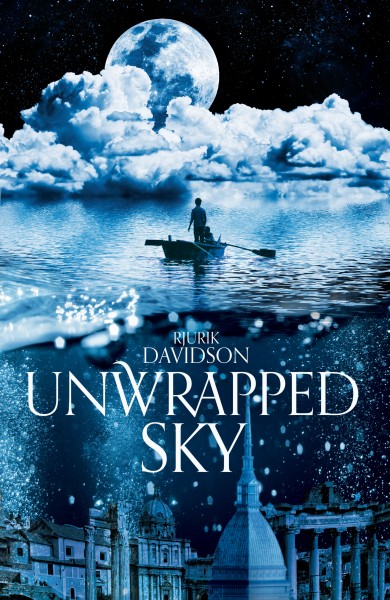Last night I dreamed I went to Caeli-Amur again. It seemed I stood by the Ancient Forum, looking out over the spirit-haunted ruins where the gods Aya and Alerion fought, and for a while I could not enter. The way was barred to me, for I was only the author, and such a person does not belong in a world of Minotaurs and Sirens, of sorcerers called thaumaturgists. The writer can’t access their own city, in this case a city something like ancient Rome and something like St Petersburg or Turin at the start of the 20th Century.
Only readers can visit the city of Caeli-Amur the way it was intended, without seeing the foundations that hold up its walls. Most will discover it through my novel Unwrapped Sky. Its tagline—in the UK version at least—is ‘The Revolution is Coming.’

Unwrapped Sky had its beginnings back at Clarion South in 2005, when in the second week I wrote a story about a character called Maximilian who descended to the Sunken City off the coast of a city called Caeli-Amur, which had a distinctly classical feel but a modern economic set-up. It featured steam-trams side by side with ancient creatures. The city was conceived before I’d read any Fritz Leiber, Gene Wolfe, M. John Harrison or China Miéville—so though it may resemble those writers’ works, I can’t claim them as influences.
One influence was certainly Samuel R. Delany, particularly his little science-fantasy book, The Einstein Intersection. Though I can’t actually recall that much of Delany’s book, something about the combination of mythology, fantasy and science fiction affected me.
The Clarion story itself was broken—as the tutor Michael Swanwick clearly and reasonably pointed out—but the workshop participants responded to the city—as Michael also pointed out. After the ‘Swanwicking’, I returned to write another story in my last week of Clarion, which forms the beginning of Unwrapped Sky. The wonderful Ellen Datlow later bought the story, and that gave me some much-needed confidence.
The city is popular for many reasons, I guess. I hope it evokes that sense of wonder that attracted so many of us as children to fantasy and science fiction. Creating a new world is a balancing act. There need to be familiar elements, to provide a certain stability for the reader—otherwise we feel we’re all at sea—but the wonder comes from innovation and inventiveness, those elements which surprise us.

Caeli-Amur is a combination of classical references—the Forum and Arena, the mythological creatures—and a political set-up much like that of the late 19th Century or early 20th Century. Both of these are familiar enough to give the reader a sense of stability, but their combination hopefully evoke that sense of wonder.
These two elements reflect my own interests. Whenever I travel in Europe, you can often find me traipsing around ancient ruins, and I still recall the children’s adaptation of The Odyssey that I read and reread. Later, I developed an interest in the politics and culture of the period running roughly from 1900 to 1939. That was the moment of cultural modernism: of Dadaism and cubism, of T.S Eliot and W. B. Yeats, of Berthold Brecht and the birth of cinema. It was also a period of great history, of ‘wars and revolutions.’ It was a time much more dramatic than ours.
Unwrapped Sky—and the city of Caeli-Amur—marries these interests. It gives us classical mythology and landscape, but it also gives us a modern world and the beginning of a revolution. It’s a story that will continue on in the next book, The Stars Askew, whose tagline might well be, ‘The Revolution is Broken.’
In fact, Unwrapped Sky’s story had been in my head for a long time. When I was about twenty years old, I’d wanted to write a fantasy novel about a society in which magicians were an oppressed class. It was going to tell the story about their revolt against the institutions of that world. But I didn’t have had the chops to write it back then, and in any case, I was busy with other things. It was only after the Clarion experience that things began to coalesce in my mind. Why not set that story in Caeli-Amur, this city which so many people liked? Of course, it turned out significantly different to how I imagined it as a twenty-year-old.
From one viewpoint, Unwrapped Sky is a historical novel—a novel about revolutions and counterrevolutions (though the recent ‘Arab Spring’ reminds us that revolutions themselves are not only historical events). Which revolution? Does Unwrapped Sky depict the world of 1789 or 1848 in France? Or is it closer to 1917 in Russia? Are the divisions between the seditionist factions representations of the Jacobins and Girondists of the French Revolution? Or perhaps the Bolsheviks and Mensheviks of the Russian Revolution?
The answers are, of course—it represents none of these revolutions and the factions don’t represent any of these historical groups. A fantasy novel is not a work of history. Rather, it sets up its own elements—its own institutions and characters, its own social forces and laws (including magical ones)—and sets them into motion. The characters are their own people. The city is its own place. A novel is a thought experiment.
Unwrapped Sky tells us about three characters: Maximilian a seditionist and thaumaturgist, who aims to overthrow the brutal rule of Caeli-Amur’s Houses; Boris, a House official rising through the ranks of House Technis; and Kata, a philosopher-assassin who is employed by Boris. The three characters, of course, come into conflict. They cannot all survive.
There’s a darkness to the story, I suppose, for Caeli-Amur is a hard place. It’s a long way from the luxuries of the Western world. None of the characters is particularly likeable and each does questionable things. In fact, I’m surprised when readers express a desire to ‘like’ a character, as if they’re considering them as friends. I’d much prefer to find them to be interesting and flawed. If there’s an influence here, it might be James Ellroy’s crime fiction.
Still, in the end, it’s easy enough to tell who of the characters is ‘good’ and who is ‘bad’, but again, I think it’s the novelist’s role to test these assumptions. We need to make the ‘evil’ characters understandable (if not exactly sympathetic) and the ‘good’ characters flawed. The most likeable characters in Caeli-Amur tend to be peripheral ones, and this expresses something about ambition, I hope, and about politics too. Great leaders during historic events are rarely models of virtue—alas.
If there’s a philosopher whose ideas animate Unwrapped Sky, it’s probably Jean-Paul Sartre. In particular, the novel might express his idea that existence precedes essence, or to express it in simpler terms, you are what you do. There’s an implicit morality to this view, of course, and I hope that’s one of the things that gets readers thinking.
There’s plenty about the book that I haven’t discussed. There’s the fact that there is a past glory days of Caeli-Amur, but that that past is of considerably advanced technology—it was a utopia, of sorts. There’s the fall from this utopia and its consequence, especially the fragmentation of the thaumaturgy into separate disciplines, which Maximilian hopes to unify (as physicists hope to unify relativity and quantum theory). There is the looming environmental crisis of the ‘Wasteland’, the feminist faction of philosopher-assassins, the ‘Matriarchists.’ There’s the prehistory of the planet and it original inhabitants, glimpsed briefly.
But enough. A novel is the beginning of a dialogue between a writer and his or her readers. Perhaps the readers of this post will seek out the book, or perhaps they’ve already read it. Maybe the book will get them thinking. Then perhaps we can do what I’d always hoped—discuss it together.
This article originally appeared April 24, 2014 on the Tor UK blog.
Rjurik Davidson is a winner of the Ditmar Award as Best New Talent and the Aurealis Award for his short fiction. His first book was a collection, The Library of Forgotten Books. A columnist, and a literary and film critic, he lives in Melbourne, Australia. Unwrapped Sky is his first novel.









